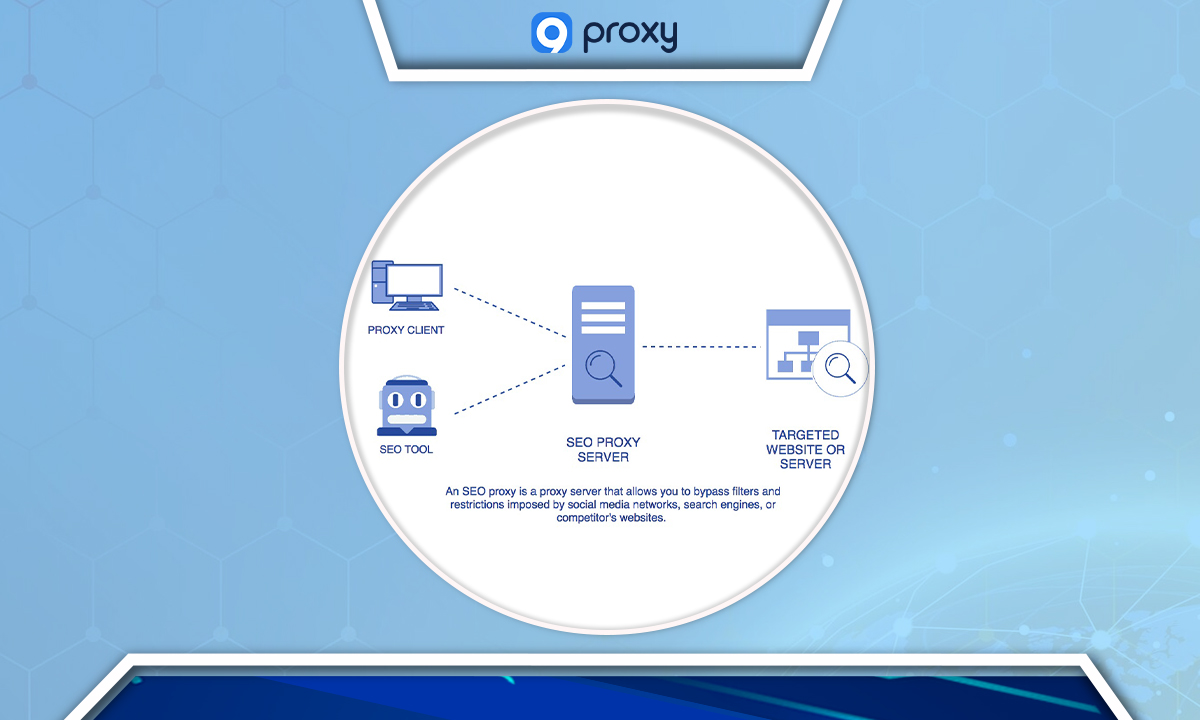The Impact of Proxy Servers on SEO: Boost Your Rankings!
Mastering the art of SEO is crucial in the digital landscape, requiring both strategic insight and the appropriate tools. "The Impact of Proxy Servers on SEO" is a critical topic we're exploring in this blog, highlighting the transformative role of proxy servers in SEO. These servers not only open up new avenues for website optimization and data collection but also play a key role in protecting your digital footprint.
Overview Proxy Servers and SEO
A proxy server is like a middleman between your computer and the internet. It helps you browse the web without showing your real IP address or where you are, giving you more privacy and safety.
In Search Engine Optimization (SEO), proxy servers are super helpful for things like tracking where a website ranks on search results, checking what the search results look like, and gathering data from websites to help improve SEO efforts. Tracking where a website ranks helps see how well it's doing for certain keywords. Checking the search results helps understand what shows up on the page, like ads and listings. Gathering data from websites can give valuable insights to make better SEO plans.
However, it’s essential to use proxy servers for SEO ethically and responsibly. Ensure that you are not infringing on privacy laws or extracting data from websites without proper authorization. Always adhere to legal and ethical standards, respecting the rights and privacy of others.

The Relationship Between Proxy Servers and SEO
Proxy servers and SEO go hand-in-hand when it comes to gathering important data while maintaining anonymity. These servers provide a way for SEO professionals to hide their real IP address, which can be beneficial in multiple ways.
One major advantage is the ability to access content that may be restricted in certain geographic locations. This is particularly useful for local SEO optimization, as it allows professionals to see how a website is performing in different regions. By using a proxy server, SEO experts can conduct research, analyze search results, and track rankings from anywhere in the world.
Additionally, proxy servers in SEO are invaluable for conducting data scraping and automation without the risk of IP bans. Search engines may restrict an IP address if it identifies an excessive number of automated queries in a brief period. Proxy servers mitigate this risk, guaranteeing seamless and uninterrupted data collection and analysis.

Positive Impacts of Proxy Servers on SEO
Proxy servers can significantly enhance SEO activities by providing a range of benefits:
- Anonymity: Proxy servers hide the user's unique public IP address, which is valuable for conducting SEO research without revealing your identity. This can be particularly useful when researching competitors, discovering the keywords they use, and tracking their rankings.
- Speed: Proxies facilitate faster access to websites, allowing for quicker data gathering. Without a proxy, web scraping can be a slow and risky process.
- Lower Error Rate: Using proxy servers reduces the likelihood of encountering errors or being blocked when scraping data or performing other SEO-related tasks.
- Reliability: A proxy server provides a stable and reliable connection for SEO activities, ensuring uninterrupted access to necessary data and resources.
- Automation: Proxy servers are essential for automating SEO tasks that require handling vast amounts of data, such as content scraping from competitors' websites, rank tracking, and technical website checks. Manual data collection can be tedious and inefficient, while proxies allow for the rapid and automatic extraction of data without the risk of being blocked or blacklisted.
- Data Accuracy: Proxies enhance the accuracy and efficiency of web scraping for SEO data, leading to more informed and effective SEO strategies. This also helps avoid being blocked by search engines or other websites.
- IP Rotation: Residential proxies ensure successful IP rotation, which is advantageous for boosting website rankings on search engine results pages (SERPs).

Negative Impacts of Proxy Servers on SEO
Proxy servers can indeed be beneficial for SEO, but there are also potential downsides to consider:
- Blacklisting: If a proxy server is utilized for nefarious activities such as spamming or hacking, it might be blacklisted by search engines and websites. This could detrimentally affect SEO endeavors, resulting in lower rankings on search engine results pages.
- Inaccuracy: Although proxies can enhance the precision of SEO data, they can also introduce inaccuracies if the proxy server is unreliable or if the IP address is flagged as suspicious. This could lead to flawed data and ineffective SEO strategies.
- Cost: Employing proxy servers for SEO can incur significant expenses, particularly for large-scale campaigns that require numerous proxies. The costs can accumulate rapidly, especially for premium proxies that offer superior performance.
- Security Risks: There are security risks associated with using proxy servers for SEO, particularly if the server lacks adequate security measures or if user data is not sufficiently protected. Such vulnerabilities could result in data breaches and other security incidents that can negatively impact SEO efforts.
- IP Rotation: While IP rotation can be advantageous for improving website rankings on SERPs, it can also lead to data inconsistencies and imprecise SEO strategies if not properly executed.
Best Practices for Using Proxy Servers in SEO
When used correctly, proxy servers can significantly enhance SEO efforts. To optimize their use, consider the following best practices:
- Choose the Appropriate Proxy Type: Different types of proxies, including residential, datacenter, and ISP proxies, are available. Select the one that best aligns with the specific requirements of your SEO project.
- Ensure Data Security and Privacy: It's crucial to protect your data when using proxy servers for SEO. Opt for a reputable proxy provider that prioritizes data security and can handle high-volume data needs.
- Employ Rotating Proxies: Rotating proxies can significantly enhance your SEO scraping efforts. They allow you to continually gather data and improve your website's ranking without interruptions.
- Verify the Proxy Service's Reliability: Before committing to a proxy service, conduct thorough research to ensure the company is trustworthy. Check if they offer proxies from a variety of C classes, which is beneficial for SEO scraping.
- Use Proxies Ethically: Avoid using proxies for malicious activities, as this can lead to blacklisting and negatively affect your SEO efforts. Always use proxies in a responsible and secure manner.
- Leverage Automation for SEO Tasks: Proxies are invaluable for automating SEO tasks that require handling large amounts of data, such as content scraping from competitors' websites, rank tracking, and technical website checks. Automation saves time and ensures efficiency, allowing you to extract data quickly and without the risk of being blocked or blacklisted.

Case Studies and Real-world Examples
Here are some examples and case studies illustrating the practical applications of proxy servers in SEO:
- Collecting SERP Data: SEO proxies facilitate search engine crawlers in collecting Search Engine Results Pages (SERP) data by overcoming geo-restrictions and IP bans. They provide IP addresses that enable reliable access to search engines and relevant domains, allowing for the swift and automatic gathering of substantial data from search engines and competitors.
- Scraping SEO Data: Proxies are instrumental in scraping content from competitors' websites, conducting rank tracking, and identifying technical issues to optimize websites. An SEO proxy enables intelligence gathering without exposing the original IP address, which is crucial for harvesting data from search engines and websites, identifying competitors' keywords, and tracking rankings.
- Keyword Research: SEO proxies offer an IP address that conceals your personal IP address, making them invaluable for keyword research. They allow for anonymous searching, enabling users to see how their website ranks without any cached browsing history and access websites that might be blocked in certain countries.
- Targeted Campaigns: Proxies can be utilized to target specific marketplaces by using a geo-based IP address. This facilitates the analysis of other markets without physical presence, streamlining the process of targeting new markets for business launches.
- Anonymity, Speed, and Reliability: Proxies enhance anonymity, speed, and reliability in SEO activities. They prevent your IP from being blocked or cloaked during extensive SEO campaigns and provide the necessary speed and scalability for data scraping.
- Data Acquisition and Analysis: Leveraging proxies in conjunction with scraping software empowers users to acquire specific data features within search engine page rankings and conduct thorough analyses. For instance, one could scrape 1000 knowledge graphs in a particular industry to discern commonalities and derive insightful conclusions.
FAQ
Is it legal to use proxy servers for SEO?
Using proxy servers for SEO is typically legal. However, it is crucial to be mindful of the specific activities you are conducting and to adhere to the terms of service of the websites you are accessing. Always use proxies in a responsible manner, in line with applicable laws and regulations.
Why would someone use a proxy server for SEO purposes?
Proxy servers are valuable tools for various SEO tasks, such as web scraping, rank tracking, and keyword research. Here are some reasons why one might use a proxy server for SEO:
- Anonymity: Proxy servers mask the user's IP address and location, enabling them to conduct competitor analysis, monitor search engine results, and gather data discreetly, without the risk of being blocked.
- Access to Geo-Restricted Content: For SEO tasks that require monitoring local search results or assessing a website's performance in a specific location, access to geo-restricted content may be necessary. Proxy servers can provide IP addresses from different locations, facilitating access to this content.
- Faster Data Collection: By distributing web scraping tasks across multiple proxy servers, users can collect data more efficiently, which is particularly beneficial for large-scale data extraction or time-sensitive SEO projects.
What types of proxy servers are best suited for SEO tasks?
There are several types of proxy servers available, such as residential, datacenter, and ISP proxies. The best type of proxy for SEO tasks depends on the specific requirements of the project. Each proxy type offers distinct advantages and may be more suitable for certain SEO activities than others. It is essential to assess the needs of your SEO project and choose a proxy server that aligns with those requirements.
In conclusion, understanding the impact of proxy servers on SEO is crucial for any digital marketer aiming for success. These invaluable tools offer anonymity, access to geo-restricted content, and enhanced capabilities for data scraping and automation. They empower SEO professionals to refine their strategies, ensuring stellar website performance across various regions. However, it's imperative to use proxy servers ethically and responsibly to sidestep any potential issues. For more insights and expert advice on leveraging technology to boost your SEO efforts, be sure to explore our other blogs here at 9Proxy.
Get Newsletters About Everything Proxy-Related